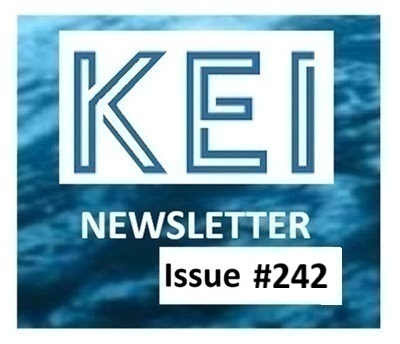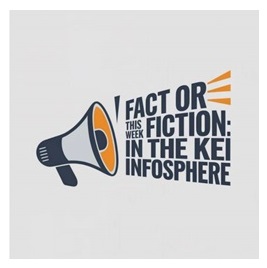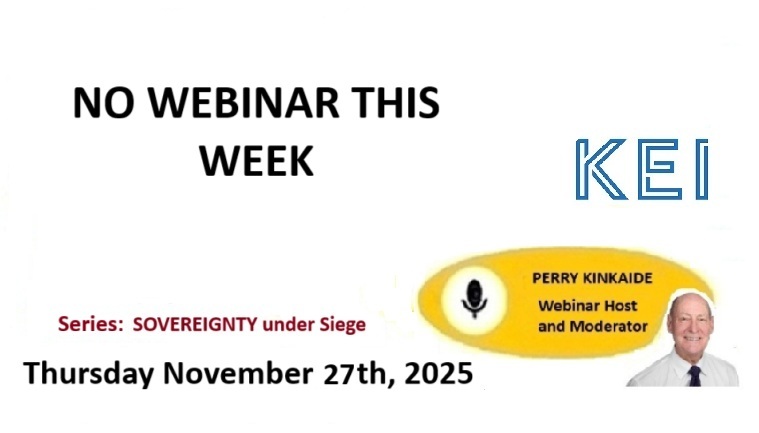|
|
DIRECTORY | ||
|
CONTRIBUTIONS: THOUGHTFUL SOVEREIGNTY: Reclaiming Reason in An Age of Protests and Outrage HERE |
ACTION: Help sustain KEI's contributions |
Fact or Fiction?
US Stepping Up to Regulate AI HERE |
|
|
Editor - Perry Kinkaide |
Sovereignty once meant borders, armies, and flags. Today, it means data, compute, and control of artificial intelligence. From America’s private-sector arsenal to China’s state-directed strategy, from Europe’s regulatory “third way” to Canada’s new sovereign compute initiative, the race for technological independence defines modern power. The question is no longer who rules the land — but who runs the code and - as discussed last week, who owns the energy to keep it running. — Editor |
||
|
TECHNOLOGICAL SOVEREIGNTY: Who Rules the Code Rules the World. Some Hard Truths About AI and National Power Contributor - Jeff Uhlich
The New Global Battlefield. Sovereignty used to be defined by physical control - over borders, armies, and natural resources. That era is over. Today, national power is defined by the control of data, compute, and the algorithms that shape what we see, think, and decide. The new global power struggle is not being fought on land or sea, but in the cloud, where the infrastructure of intelligence determines economic and geopolitical futures. But beneath the hype, a brutal restructuring of global power is accelerating, leaving complacent nations behind. This article cuts through the noise to distill some hard truths about this new geopolitical battlefield, revealing the stark choices facing a stalled Canada and what it means to be sovereign in the 21st century. Continued below
Continued from above Hard Truth #1: Sovereignty Isn't About Land Anymore - It's About the “Sovereignty Stack”. True national control no longer depends on legal lines on a map but on the “sovereignty stack” - the integrated layers of data, models, compute, and talent. For years, the conversation focused on “data sovereignty,” the legal principle that data generated within a country's borders is subject to that nation's laws. This is the foundation for protecting citizen data and sensitive government files.
But as AI has become an engine of economic and military power, it’s become clear that legal control is meaningless without technological independence. This has given rise to the more comprehensive concept of “AI sovereignty”: a nation's ability to independently control the entire technological stack that powers its AI systems. This includes the physical data centers, the proprietary models, the datasets used for training, and the policies governing it all. Simply put, you cannot be sovereign if another nation owns and operates the infrastructure your society runs on. Jensen Huang, CEO of Nvidia has long recognized the importance of Sovereign AI which emphasizes a country’s ownership over its data and the intelligence it produces:
“It codifies your culture, your society’s intelligence, your common sense, your history – you own your own data,” Huang said.
The world’s new empires are being built not with armies, but with algorithms; not through conquest, but through code.
Hard Truth #2: Canada is a World Leader in AI Minds, But a Laggard in AI Means. At the heart of Canada's AI journey is a core contradiction known as the “laggard paradox.” On one hand, Canada is a celebrated global pioneer. It was the first country in the world to launch a national AI strategy in 2017 and is home to world-class research institutes like Amii, Mila, and the Vector Institute, which have attracted some of the field's foundational researchers. Geoffrey Hinton at the University of Toronto is called the “Godfather” of AI, Richard S. Sutton, right here in St. Albert literally wrote the book on Reinforcement Learning, and Yoshua Bengio is the most cited living researcher in history. Richard Sutton received the 2025 Turing Award (Computing’s Nobel Prize), and Hinton and Bengio were joint recipients in 2018. Here at the University of Alberta, Jonathan Schaeffer and David Wishart are widely recognized luminaries. Ilya Sutskever, an OpenAI founder and its former Chief Scientist, was a student of Geoffrey Hinton’s at the University of Toronto.
But this leadership in “minds” has not been matched by investment in the “means” of AI production. This created a “sovereignty deficit,” characterized by a severe lack of domestic computing infrastructure that caused some researchers to flee and businesses to rely on foreign providers. This was compounded by alarmingly low business adoption rates - in 2021 less than 4% of Canadian firms reporting the use of AI in their operations - roughly half that of other developed nations at the time. This history highlights the critical difference between having an “AI Research Strategy,” which Canada excelled at, and an “AI Industrial Strategy,” which it critically lacked.
Hard Truth #3: AI's Biggest Appetite Isn't for Data - It's for Electricity. The exponential growth in the power of AI models has created an equally exponential demand for one crucial resource: energy. The massive data centers required to train and deploy advanced AI are reshaping national grids, making a nation's ability to supply clean, affordable, and reliable power a direct prerequisite for competing in the new AI economy.
Powering this revolution requires more than just silicon; it requires electricity on a massive scale. Nations that cannot guarantee their energy supply will find themselves unable to power the computational infrastructure needed to maintain their technological independence and economic competitiveness. In this sense, energy sovereignty and tech sovereignty are now one and the same.
Hard Truth #4: The World's Superpowers Are Turning Private Companies into Geopolitical Weapons. A fascinating convergence is happening on the global stage. Despite their different political philosophies, the world's major powers are increasingly adopting a “national champion” model, elevating key domestic companies into instruments of state policy and geopolitical competition.
The United States leverages its dominant private sector - firms like Google, OpenAI, Anthropic, and xAI - as strategic national assets. This goes beyond simple partnerships; the government has streamlined procurement by adding these firms to the General Services Administration's (GSA) pre-approved vendor list, deeply integrating their technologies into national security and defense projects. China pursues a state-directed approach, backing its drive for technological self-reliance with staggering capital: over $100 billion in state funding is allocated for 2025 alone. It designates “AI national teams” like Baidu and DeepSeek to execute its national plan, hailing DeepSeek's success as a major strategic victory against U.S. sanctions. Meanwhile, France has put its full political and financial weight behind Mistral AI, championing it as Europe's answer to American tech giants and a bulwark against digital colonization. But without sovereign capabilities, Europe risks becoming an “AI colony”.
Hard Truth #5: Canada's Comeback is a $2 Billion Bet on a National Champion. In 2024, Canada executed a dramatic and necessary pivot to address its critical “compute deficit.” The $2 billion Canadian Sovereign AI Compute Strategy is a direct and decisive response aimed at building the domestic infrastructure needed to reclaim the nation's technological sovereignty and resolve the laggard paradox.
At the heart of this strategy is Toronto-based Cohere Inc., which has emerged as Canada's de facto national champion. Cohere, whose founder Aidan Gomez co-authored the seminal “Attention Is All You Need” paper that underpins all modern large language models, is the “flagship recipient” of the new strategy. The government's investment is designed to help Cohere build a domestic, cutting-edge AI data center, creating a national anchor for Canada's entire AI ecosystem. This high-stakes bet mirrors the global trend, positioning a single enterprise at the core of a national ambition to turn research excellence into sovereign industrial capability.
From Consumers to Creators. In the 21st century, the measure of national power is shifting. True sovereignty is no longer about being a passive consumer of foreign technology, but an active creator and owner of your own. Nations that control their own “sovereignty stack” - from the data and algorithms to the compute and energy that power them - will be the rule-makers, not the rule-takers, in the new global order.
Canada's new industrial strategy is a crucial and high stakes attempt to make this fundamental shift. It’s a recognition that dependence on foreign infrastructure is dependence on foreign will. The outcome is not guaranteed; it hinges entirely on executing this bold plan with the speed and scale required to compete.
For a nation that has too often been generous with opinions and cautious with actions, the challenge is not merely technical or economic; it’s a test of national will.
Sovereignty isn’t what we demand from others. It’s what we demand of ourselves. |
 TECHNOLOGICAL SOVEREIGNTY: Who Rules the Code Rules the World
TECHNOLOGICAL SOVEREIGNTY: Who Rules the Code Rules the World


